Key points: Whenever we discuss a school, we always begin from the educational philosophy of the institution, its curriculum and its campus facilities. This year marks the tenth anniversary of YK Pao School, and The Bund is fortunate to have the opportunity to have a conversation with co-founder Philip Sohmen, and hear about how the school was founded and developed. Philip Sohmen believes an ideal school should have the proper hardware: a library, gym, swimming pool and auditorium. The greatest challenge for Pao School is to integrate Chinese and international education models at a world-class standard.
Article| Wu Yanqiao Photography | Hong Zheyu
Editor| Wen Chen
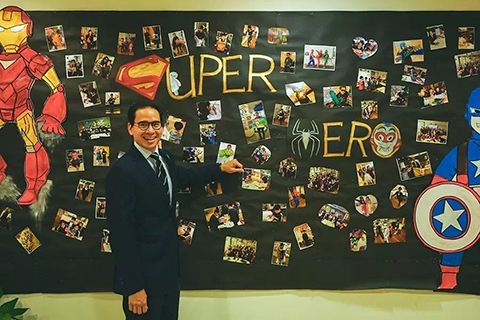
The day of the interview was sunny. We waited for Philip Sohmen in the Primary Division library, where the setting was tranquil. It was summer vacation and there were just a few students reading quietly.
Though Philip Sohmen went to the UK to live at the age of eight, his Chinese is quite fluent. While he does not speak quickly, he expresses himself very confidently in Chinese. This grandson of shipping magnate YK Pao received a superior education at schools in both the UK and US.
Ten years ago, Philip Sohmen gave up a high-paying job and a founded a school in Shanghai with his mother Anna Pao Sohmen. He applied what he had learned over the previous twenty years to establishing and developing Pao School. The time has gone by quickly, and much has changed at Pao School since its founding in 2007.
Confidence from Eton College
One’s perspective on education is always related to his or her background. And the educational record of Philip Sohmen is extraordinary. He attended leading schools in different places, but his performance was always the same: at the very top of his class.
As a child Philip Sohmen lived in Hong Kong. His mother thought it was more important for him to become fluent in Mandarin than Cantonese, so he attended both Chinese and international kindergartens so that he could master Chinese from a young age. While Philip studied and worked in the West for years, Chinese-language education remained important to him, and it forms a cornerstone of the Pao School educational philosophy.
When he was 13, Philip was awarded Eton College’s King’s Scholarship and he went to study at the UK’s top middle school. Studying at Eton was a transformative experience for Philip as it was there that he learned to be confident in himself. Philip says that every Eton College graduate is confident, serious, diligent and devoted to pursuing his dreams.
Philip says: 'Whole-person education is the cornerstone of the Eton experience. Eton does not only emphasise academic excellence. For Eton students, it is more important to develop the right set of values, people skills and practical abilities than to consistently earn the highest test scores.'
Inspired by the educational philosophy of Eton College and from his own experience there, Philip brought the same ideas to Pao School. In his view, learning extends far beyond the classroom and academic texts: It should also happen on the playground, in co-curricular activities and in residence halls. A fundamental mission of Pao School is to cultivate the character of its students.
After graduating from Eton College, Philip Sohmen was admitted to both Oxford University and Harvard University. After evaluating course offerings at both schools and the differences between British and American universities, Philip chose Oxford as he liked the relatively open nature of the UK university system. Philip earned a Philosophy, Politics and Economics (PPE) degree from Oxford.
Three years later, he went on to pursue a Master’s degree in East Asian Studies at Stanford University, and received an award for writing the top thesis on the economies of East Asia.
During my discussion with Philip Sohmen, I found it hard to imagine why he would deviate from the highly successful path of his first 20 years, and choose to found a school from the ground up. Such an endeavour inevitably involves a great deal of tedious work. The answer to that question began from “a small thing” 10 years ago.
Changing the future with education
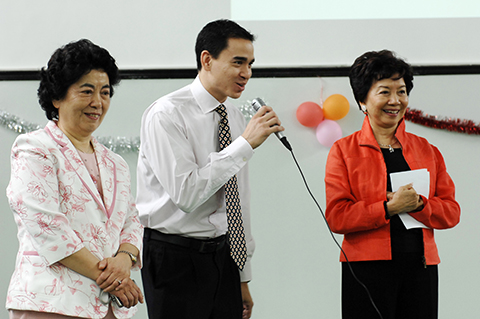
The three co-founders Tan Fuyun, Philip Sohmen and Anna Pao Sohmen (left to right)
During one summer vacation Philip Sohmen was transferring at Singapore’s Changi Airport, and he noticed several Chinese kids make a beeline for the airport shops right after disembarking. One of the children bought three pairs of athletic shoes from the Nike store, and showed them off to his classmates. This seemingly mundane scene had a profound impact on Philip: He began to feel concerned about the values and education of China’s youth.
Not long after that incident, Philip and his mother met with Eric Anderson, who had been headmaster of Eton College when Philip was a student there. Over lunch, they discussed education, among other things. After hearing about Philip’s experience at the airport and his concerns, Eric said: ‘Why don’t you two found a school? I support you’!
Yet to be sure, founding a school is no small task. And while the catalyst for the establishment of Pao School was the scene Philip viewed at the airport, he was well prepared for the process thanks to his family’s long-standing support for education. This is the reason why Philip made a career change and devoted himself to the field of education.
Around the time Philip and his mother decided to establish Pao School, Philip was working in the US. He had just been promoted, and his career looked set to take off. Yet after speaking with his mother on the phone, he felt certain he wanted to return to China to pursue their dream of founding a school. To him, nothing is more meaningful than education.
At that point, he rolled up his sleeves and got to work, carefully choosing the headmaster, teachers, and recruiting students. Although Headmistress Ni had passed the retirement age at that time, she was devoted to the establishment of Pao School. She created the concept of ‘joyful learning,’ which went on to become a central tenet of Pao School’s educational philosophy.
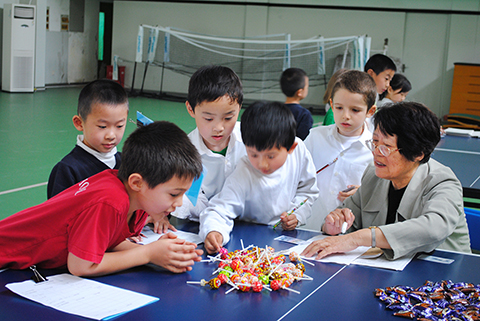
Ni Guyin teaching
The concept of ‘joyful learning’ endeavours to nurture students’ creativity, in contrast to traditional Chinese teaching methods. Further, ‘joyful learning’ aims to cultivate in students’ leadership skills, a sense of responsibility, and the ability to adapt to fast-changing circumstances – especially the ability to manage pressure. Finally, ‘joyful learning’ works to provide students with a solid moral foundation. Overall, this ensures that students have a sense of well-being as they pursue their education.
Most students in China feel happy to have a sick day, because it means a day off from school for them. But that is not the case at Pao School. ‘Some students may feel so sad that they cry if they are unable to come to school’, Philip says. ‘When students love coming to school this much, we can say that’s joyful learning.
Inevitably, there are some doubts about ‘joyful learning’, as the concept can be easily misunderstood. Philip Sohmen says that ‘joyful learning’ is not about the pursuit of happiness; happiness is not the goal; it is the method.
‘Joyful learning’ is about inspiring students to learn and feel happy about learning. It endeavours to make students feel it is fun to learn, that their teachers are not pushing them to learn; rather they are pushing themselves because they enjoy learning.
When discussing this issue, we should mention another core practice of Pao School – extensive communication with parents. Changing parents’ definition of success is more important than changing the educational system, Philip says. Thus, Pao School insists on engaging with parents prior to a student’s enrolment to understand their ideas about education as well as their expectations for their child. This allows the school to better understand the student’s needs and provide the best experience for him or her at Pao School.
Founding an international Chinese school
Philip Sohmen founded Pao School with the belief that the right type of education could provide students with a brighter future. And indeed, students changed for the better after studying at Pao School for many years.
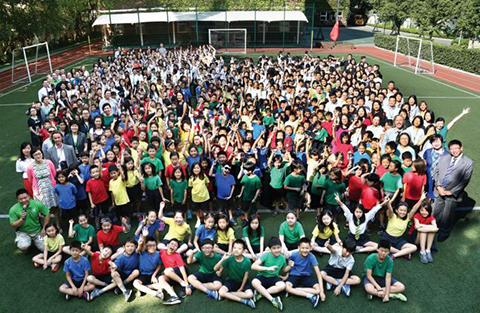
Primary Division is one big family
During our interview, Philip Sohmen recalled something that happened at Pao School a few years ago. Students were being interviewed and someone in the audience asked a Year 5 student, ‘What have you learned at Pao School’? The student replied, ‘how to think freely’.
This answer was not prepared in advance; the student thought about the question carefully before he replied. He was being sincere. Philip Sohmen hopes that all Pao students are independent thinkers rather than simply following the crowd, thinking and acting as they believe others think they should.
Philip Sohmen says: ‘Pao students are good at expressing themselves. This is imperative to cultivating talent with innovation capabilities. Innovators must have their own ideas and not be afraid to ask hard questions; they cannot wait for teachers to provide them with standard answers’.
One of the most important aspects of the Pao experience is the camaraderie built among classmates. This can be seen as even more important than the school’s world-class faculty and facilities, especially as many of the students are only children. Their classmates can become like their siblings.
Pao School’s British Xueyuan System is similar to the Magic School in Harry Potter. Students from different years are organised in a horizontal manner; the students all have a strong sense of belonging and value being part of the group. As this environment is completely different from what they experience at home with their parents, they are able to grow.
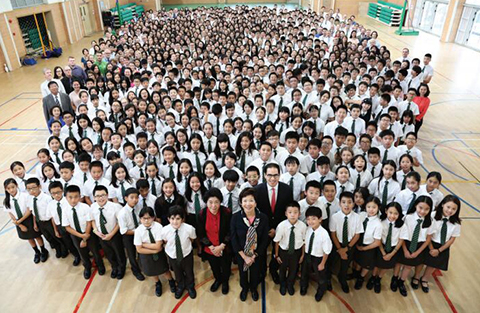
Secondary Division is one big family
Philip Sohmen defines Pao School as an international Chinese School. ‘At our core we are a Chinese school, but we have internationalised our curriculum and pedagogy’, he says. ‘We have adopted a global curriculum, and we do not just teach the content, we also introduce the concepts and teaching methodologies’. For Philip, it is imperative that Pao School focuses on character building and helping students to learn effectively. In international education, ‘the process is more important than the results’, he says.
When discussing the greatest challenge of the past decade, Philip says it has been to develop a new educational model – a fusion of Chinese and global education methods. It has taken time for Pao School’s approach to be accepted by teachers, parents, the local authorities, and society as a whole.
At the beginning, the toughest thing was to explain to different groups what Pao School sought to do, in particular to describe its vision.
Over time, a new challenge has emerged: how to maintain Pao School’s unique culture and spirit as it evolves. ‘We are committed to creating a unique campus culture, to building a school with heart and soul’, Philip says. ‘How will we maintain our identity as the years go by? This is something for us to consider’.
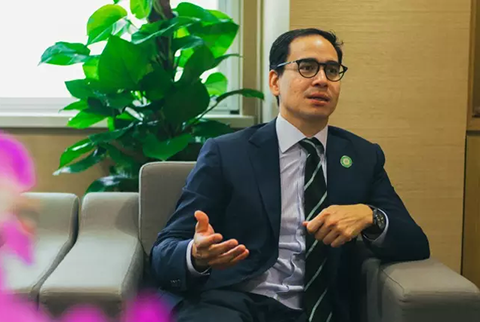
B: Bund Education
S: Philip Sohmen
B: Why was Pao School founded?
S: Our family has always cared greatly about education and we think education holds the key to China’s future. Education can be transformative. My grandfather focused on university-level education, but we now feel change should begin earlier in the educational process. My experience at the Singapore airport of seeing a group of Chinese students attending summer camp makes me think that Chinese students are excellent but need more comprehensive education to reach their full potential. From this initial idea, my mother and I set out to build Pao School.
Our former headmaster at Eton College, Eric Anderson, met with my mother and me. He told us: ‘If you really want to have a substantial impact on students’ lives, if you really want to change things, you need to found a school of your own, not just talk about how you want to make changes, or donate to other schools.’
Back then I had just finished my Master’s. I had a good job in the US and had just been promoted. But my mother told me she had a dream to pursue – an education dream – and asked me if I could help her to make it a reality. At that point, I realised education was my calling; nothing is more important than educational work, regardless of the position and working environment. I eventually decided to give up the job in the States and came to Shanghai to start all over again.
B: At Pao School, Chinese and foreign teachers prepare lessons together for a single subject. What is the advantage of this approach?
S: Our curriculum is very unique in that it integrates Chinese and international material and methodologies, and instruction is bilingual. This is an immersion model of education, which ensures all subjects are taught simultaneously in English and Chinese. Bilingual education generally works to strengthen one’s foreign language skills; for Chinese students (at schools other than Pao School), that means they typically can take some additional English-language classes. But at Pao School all instruction is bilingual, including history, geography and the sciences.
Chinese and foreign teachers work together because that is how we teach at Pao School, and it sets an example for our students. Bilingual instruction is a means for our students to learn non-language subjects, and they do very well with it.
Recently Zhang Jie, President of Jiao Tong University, spoke at Pao School and we showed him our science lab. During his visit to the lab, a foreign teacher was holding a biology class. Key vocabulary on the whiteboard was written in English, but the students were able to speak with Zhang Jie in Chinese about the course content. So you can see that in different subjects our students can use both English and Chinese to communicate.
B: For a school, what do you think is essential in terms of campus facilities?
S: The library is located at the heart of our campus at Pao School. Why is it so important? Because a library is a place where students should develop good habits like studying independently and reading. Knowledge is limitless, and you can never finish sharing all the knowledge you’d like to as a teacher, so we teach students how to obtain knowledge on their own. In the classroom, our teachers lead the students, but in the library the students are free to pursue knowledge independently.
The second key facility is the gym. Our old campus did not have one. Since we place a strong emphasis on physical fitness, we made space for an athletics center on our new campus.
The third important facility is the swimming pool. We would like students to exercise daily, but sometimes the air is bad outside. In this case, students can still exercise by swimming in the pool. The pool is open from morning to evening. Before class begins, before 7am, students are typically already swimming in the pool. I think all students should become good swimmers. It’s a sport everyone can do, and it’s important to start from an early age.
The fourth key facility is our auditorium. It is not just for meetings; it is for performing. Student performances are a key part of what distinguishes Pao School from its peers. We have student choirs and bands, and we provide them with a place to perform.
B: Can you share your typical day at Pao School?
S: Whenever I am in Shanghai, I come to the school because I like to engage with students more than anything. If there is a student performance, I will definitely be there. Recently I saw Secondary Division students perform a Shakespeare play outdoors. The students found the language (Early Modern English) used in the play difficult but their teacher was very persistent in helping them prepare for the play, and they actually did quite well.
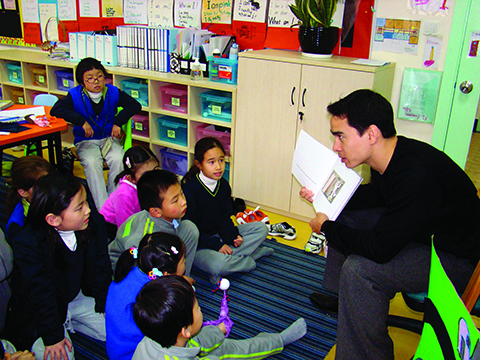
Philip reads to students
When I am busy I usually use lunch time to talk to students. We eat together and I listen to what they are learning about, how they feel about the school, and what things interest them. I think the happiest part of my work is talking with students, but I spend most of my time doing planning work with teachers.
B: You once said ‘people are three-dimensional and education is one dimensional’. What did you mean by that?
S: Traditional education only passes along knowledge, and knowledge is only one part of people. Having knowledge alone is not enough to be a successful person. The people we educate at Pao School should have knowledge, but they also should be capable, have the right values, and be people of substance.
B: Pao School values sports. How do kids view sports?
S: First, sports teach students about teamwork; playing sports, they learn the world does not revolve around them.
Second, playing sports helps students develop perseverance. Sports are all about competition, and from playing sports students learn the more effort you put in, the greater the rewards.
Third, playing sports helps students to relieve stress. Their lives are stressful, and given how connected the world has become, that adds to the pressure they feel: the onslaught of information coming from the internet. We need to release that pressure, and of course, the time they spend playing sports needs to be managed properly.
B: Pao School focuses on whole-person education and joyful learning. What is the result with regards to the students?
S: To begin, students gain confidence and are able to see the world from different angles. Recently, I had lunch with a Year 7 student and a visitor. We talked about science, and I asked the student what area of science he found interesting. He told me that he didn’t like science, but he liked geography, and he explained why.
I was happy to hear that. Our student showed me that he could pursue his own path; he was willing to express himself and take responsibility for his beliefs. This is very important; students should not blindly follow teachers.
Secondly, our students are all willing to help each other out. They have a real sense of solidarity. There is no negative competition among students. When describing their peers, our students talk about each other’s strengths. This is important. I think most of the time whole-person education is about this kind of spirit.
B: What is your international education ideal?
S: International education has become a major trend in China in recent years with China’s internationalisation amidst a wave of globalisation. We need more than international education, however; we need diversified education. What is paramount is learning how to effectively integrate Chinese and international education models.
Originally, many international schools were established in China for the children of expatriates. However, that trend is changing now as an increasing number of Chinese students are attending international schools. We strive to maximise the degree of integration of international and Chinese education models, like no school has ever done before.
Ideally, education is open, diversified, and puts students at the center. On this path, Pao School has been a pioneer.